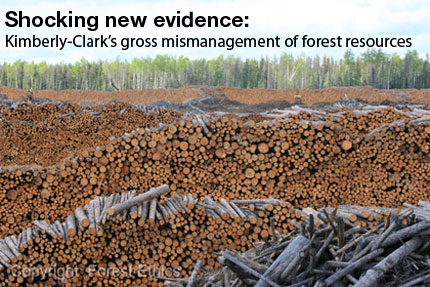
Thats what is going on right now. Shocking new photos released today reveal the existence of a massive stockpile of old-growth logs that are destined to become disposable products like Kleenex tissue and Cottonelle toilet paper for tissue giant Kimberly-Clark Corporation (K-C). The logs originate from the Ogoki Forest, the single most ecologically valuable area left in Ontario’s southern Boreal Forest and the site of growing controversy.
The stockpile is evidence of Kimberly-Clark’s egregious mismanagement of the forests despite company claims that “much of [the] fiber from the Canadian Boreal forest comes to K-C in the form of wood pulp produced from sawdust and chips – or leftovers – of the lumber production process.†(1)
As these new photos and recent government correspondence reveal, Kimberly-Clark is currently purchasing huge quantities of pulp made primarily from whole, old-growth trees from intact areas of Canada’s Boreal Forest. According to the Ontario Ministry of Environment, the stockpile contained 85,000 cubic metres of wood as of the end of March 2008. That’s equivalent to over 7,000 logging trucks full of wood. Since the closure of an area sawmill in June 2008, this wood has been trucked to the Terrace Bay pulp mill where it is being turned directly into pulp for Kleenex and other disposable products. In total, the logs will have been trucked 6-7 hours from the forest to the mill.
What’s worse, even with this massive stockpile of timber already cut and waiting to be pulped, the Ogoki Forest continues to be logged, largely in order to supply Kimberly-Clark.
The Ogoki Forest is the northernmost area in Ontario subject to logging. Unlike other forests in the province that have been logged for the last 70-100 years, the first industrial logging in Ogoki did not occur until 1998. For this reason, it is the most intact of all the forest management units in Ontario. Because the neighboring Kenogami Forest was managed so poorly by Kimberly-Clark and then Buchanan Forest Products, and because regeneration there has been so unsuccessful, logging company Buchanan is pushing further and further north to supply its pulp mill at Terrace Bay.
The size, location, and near pristine state of the Ogoki Forest make it critical habitat for the threatened woodland caribou, while its carbon-dense trees and soils make it critical for mitigating climate change. The Kenogami Forest was turned from a vast expanse of healthy, near-pristine forest to a severely damaged landscape rife with environmental problems during 70 years of mismanagement by K-C.(2) The Ogoki Forest cannot be allowed to become the next Kenogami.
Unfortunately, as this new photographic evidence shows, Ogoki is already being subjected to the same gross mismanagement as the Kenogami. As incredible as it may seem, K-C is apparently willing to risk total devastation of yet another valuable eco-system in order to make its disposable paper products.
In light of the discovery of this staggering woodpile that was once pristine ancient Boreal Forest, Greenpeace is calling on Kimberly-Clark to ensure that no more fiber from the Ogoki Forest enters its product stream by immediately engaging with us and other stakeholders in a process to revise its ineffective and unsustainable fiber procurement policy.
1 Kimberly-Clark Fact Sheet on Sustainable Fiber Practices updated July 30,2008. http://www.kimberly-clark.com/pdfs/KC_Sustain_NAmerica.pdf (pdf)
2 Greenpeace. 2008. Cut & Run, Kimberly-Clark’s legacy of environmental devastation and social conflict in the Kenogami Forest. http://www.kleercut.net/en/node/936
Fast facts:
– As of the end of March 2008, the stockpile contained 85,000 cubic metres of wood, equivalent to over 7,000 full logging trucks
– According to the Ontario Ministry of Environment, the stockpile has now diminished to 12,000 cubic metres, as large amounts of pulp have been shipped to Terrace Bay for pulping since the shutdown of the Nakina sawmill in June
– The distance between where the stockpiled wood was logged and where it will be pulped is an approximately 6-7 hour drive
– Kimberly-Clark purchases 55 per cent of the 420,000 metric tonnes (462,970 tons) of pulp produced at the Terrace Bay pulp mill each year, an amount equal to the weight of over 1150 jumbo jets
– Kimberly-Clark uses the pulp produced at Terrace Bay to make Kleenex, Cottonelle, Scott and Viva brand products that are sold across North America and Europe.
Kimberly-Clark is no longer purchasing pulp from this mill.
…. :(
this practice has to stop…forever.
yeah you tell em mommey